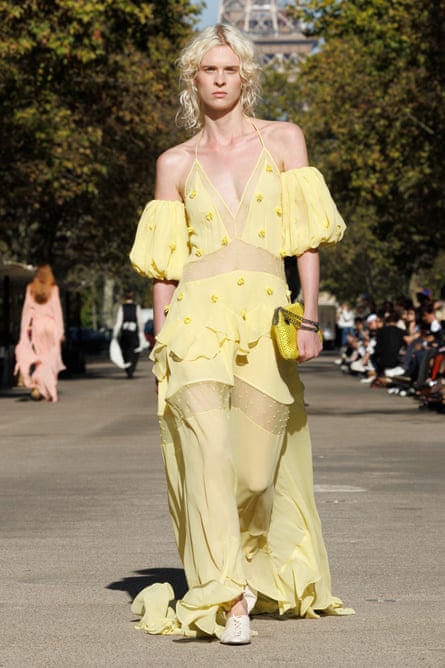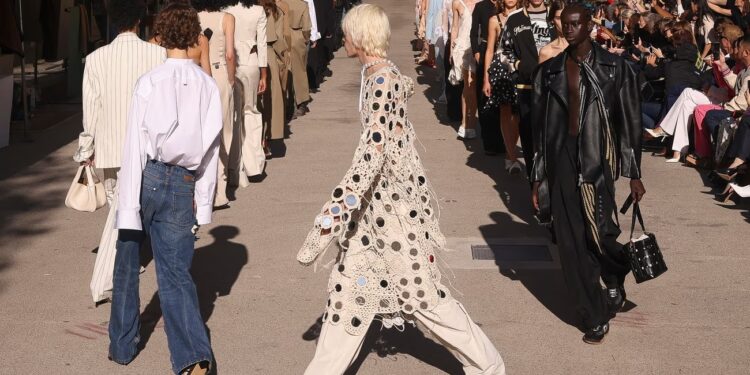Designer brings back some of her signature looks and collaborates with her father at show celebrating sustainable style
As she sees it, Stella McCartney’s job is not to sell clothes on a catwalk but “to sell sustainability to the world”. At Paris fashion week, she hosted a “plant-based, nature-positive, solution-focused” street market with 21 stalls selling and explaining sustainable produce ranging from “crochet” minidresses made from seaweed to Linda McCartney veggie burgers.
“This is honestly one of the most momentous days of my life,” said the stall-holder Tessa Callaghan, the chief executive and founder of Keel Labs, whose Kelsun yarn features in McCartney’s new collection in several boho openwork-knit summer dresses, which look like crocheted cotton but are made from renewable kelp. “Today is the first time one of our products has ever been seen in public, and this event is the best way I could have imagined that to happen.”
Seaweed, says Callaghan, is “a planet-positive raw material because it is extremely abundant and, unlike cotton, it doesn’t require fertiliser or pesticides. It involves no water consumption, no land use and no fossil-fuel reliance.”



At the Radiant Matter stall, show-goers admired a shimmering dress made from the company’s new biodegradable alternative to sequins, which harness iridescence from within the organic structure of natural raw materials to mimic the glimmer of sequins, without the harsh environmental footprint. Radiant Matter has collaborated with McCartney to produce a dress and a jumpsuit.
McCartney after the show: “Fashion has always been a place where people find their family and their gang, and this is a moment for a community who care about fashion and the environment to come together. And also, who doesn’t love a French market?”
The designer collaborated with her father for part of the collection on the catwalk, which celebrated clothes that get handed down through generations. “I always took pieces out of both my mum and dad’s wardrobes, and now my daughter borrows from me,” she said.
Wings graphics taken from her parents’ life on tour were reworked on organic cotton T-shirts, worn with embellished waistcoats that borrowed a vibe from Paul McCartney’s 1970s stage-wear. Lace-trimmed slip dresses and feminine tailoring, strong suits of the brand since its inception, revived Stella’s catwalk greatest hits in a celebration of the principle of shopping your wardrobe.

And just when you thought sustainable fashion could not get any more glamorous and rock’n’roll, there were handbags made from champagne. Well, sort of: the grapes used to make the vegan “leather” Frayme bags in the collection are byproducts in the production of Veuve Clicquot, which is owned by McCartney’s investors, LVMH.
Peta has disrupted a number of catwalk shows this season to protest against the use of leather, and consumer interest in vegan alternatives is growing. But the challenges facing startups attempting to go head to head with leather, the most lucrative sector of the fashion market, were shown in June when the American startup Bolt Threads paused production of Mylo, a mycelium-based leather alternative, after failing to secure the investment necessary to scale up.
Ninety-five per cent of the collection is made from materials the brand considers to be responsible, up from 92% last season and 91% the season before that, according to McCartney.
“We’re not here to make you feel guilty,” she said. “It’s just about doing what you can, taking a water bottle and a shopping bag out with you when you leave the house or whatever. And not consuming so much fashion because we know we don’t need it.”
Source: The Guardian



Recent Comments